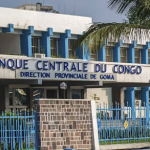
The government of the Democratic Republic of Congo has denied responsibility for the closure of banks and financial institutions in areas controlled by M23 rebels, citing security concerns for individuals with savings accounts in those areas.
Before the Rwanda-backed rebels took control of Goma in North Kivu and Bukavu in South Kivu, banks and other financial institutions in those regions had ceased operations.
The rebels’ reopening of the Caisse Generale d’Epagne du Congo (CADECO) has not produced the expected results but aggravated the situation, especially as CADECO branches only pay taxes to the rebel authorities.
There have been ongoing calls for the authorities in the DR Congo to reopen banks to alleviate the financial hardships faced by the population. In response, government spokesperson Patrick Muyaya explained that the banks are not closed due to the government’s decision but rather due to security concerns affecting individuals with savings accounts.
Muyaya expressed concerns during a press briefing, stating that ongoing tensions in Kivu have led to punitive measures against its populations due to the banking sector’s dysfunction. “Let them not lie to you. These people do not have the right to utilise the American dollar in any way,” he said, emphasising the legal ramifications of engaging with movements under U.S. sanctions.
He clarified the situation by explaining that “the banks are not closed because the government wants it, but because of how the system functions and the security conditions,” indicating that the closures are a complex issue tied to broader systemic and security problems. The government’s spokesperson says he hopes for expeditious peace initiatives to alleviate the suffering endured by the Congolese communities affected by rebel control, which he attributed to support from Rwanda.
“The President of the Republic and all of us in government are working to push all the processes going on, and this situation, the butchers in Goma, must quickly stop. I recall the necessity for all of us always to express the sentiment of support and solidarity to affected populations,” he added.
However, Joseph Kabila, a former president of the DR Congo, criticised the government for neglecting the people, particularly by disconnecting local financial institutions from the national banking network, and restricting the movement of people and goods.
Calling for the humanisation of the living conditions in this part of the country, the former president exhorted the authorities to protect the population and insisted that “the army, justice and other structures in charge of security and order must in reality be in the service of the population and respond to their aspirations”.
The Bishops of the National Episcopal Conference of Congo also expressed their disquiet at the persistence of the multifaceted crisis affecting the DR Congo. In a statement made public on Friday, May 16, the religious leaders deplored the degradation of the political climate and the deterioration of the socio-economic situation, especially in the zones under the control of the M23/AFC rebels supported by Rwanda.
For bishops, the closure of banks and airports in the territories under the control of the M23/AFC rebels imposes precarious and challenging living conditions on several families.
The government of the Democratic Republic of Congo has disclaimed responsibility for the closures of banks in regions controlled by M23 rebels, attributing them to security concerns.
Prior to the rebels’ takeover, financial institutions in Goma and Bukavu had already halted operations. The rebels reopened CADECO, worsening the situation as taxes are only paid to the rebel authorities. Government spokesperson Patrick Muyaya emphasized that banks closed due to security conditions, not government directives, and stressed the legal issues with using currency under U.S. sanctions.
Former President Joseph Kabila criticized the government for neglecting the people by severing local financial institutions from the national network. He urged the protection of affected populations, calling on security forces to prioritize public welfare. The National Episcopal Conference of Congo’s Bishops expressed concern about the ongoing crisis, highlighting the deteriorated socio-economic conditions in areas under rebel control, worsened by bank and airport closures, impacting residents’ living conditions.
The government aims for swift peace initiatives to mitigate these hardships.
